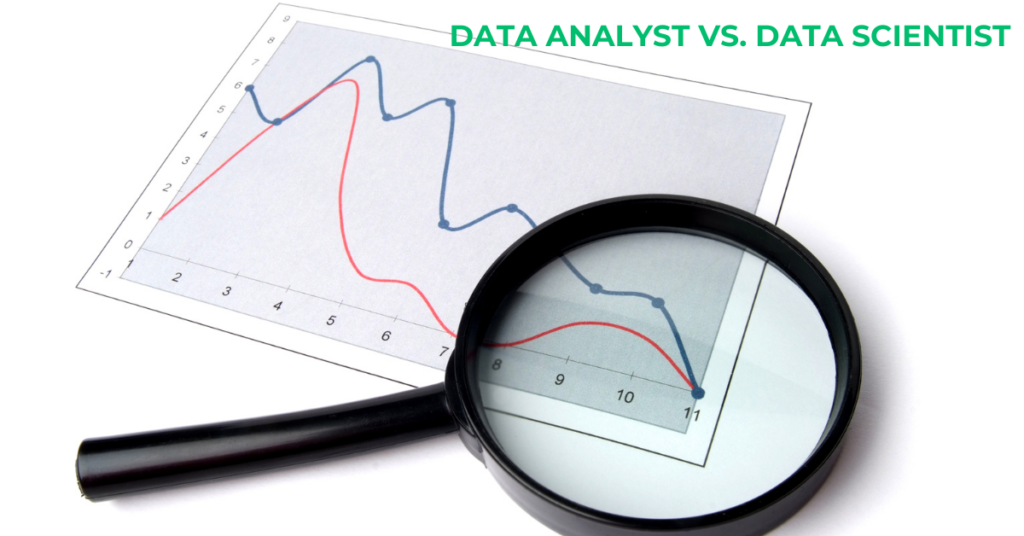Data Analyst vs. Data Scientist: Differences You Need to Know

Data is everywhere these days, right? From what you eat to what you buy, numbers tell a story. But who’s actually reading those stories? That’s where data analysts and data scientists come in. They’re like detectives, but their area of expertise lies in solving business puzzles using numbers instead of crimes. However, both fields are also distinct from each other. So, do you want to know more about the data analyst vs data scientist differences to figure out which path is right for you? Then read on!
Who is a Data Analyst?
 Role and Responsibilities
Role and Responsibilities
A data analyst focuses on interpreting existing data to provide actionable insights. Data analysts primarily work with datasets, using tools such as SQL, Excel, and visualization software like Tableau. They clean, organize, and model data to identify trends, make forecasts, and present findings that help businesses make informed decisions. This process involves understanding the business needs, extracting relevant data, and translating it into understandable information for decision-makers. Consequently, the role of a data analyst is vital in ensuring that businesses can leverage data effectively.
Skills Required
Moreover, data analysts need a strong foundation in several areas:
- Statistics and mathematics is crucial for analyzing and interpreting data
- Proficiency in SQL and Python is essential
- Expertise in data visualization tools such as Tableau and Power BI
- Strong ability to analyze and draw insights from data
- Ability to present findings clearly to stakeholders
- Ensuring accuracy in data analysis
Educational Background
Typically, data analysts hold a Bachelor’s degree in fields such as Mathematics, Statistics, Computer Science, and Economics. While certifications can enhance job prospects, a master’s degree is not usually necessary for entry-level positions. However, do remember that continuous learning and certifications in specific tools or methodologies can significantly boost a data analyst’s career prospects. Practical experience through internships or project work is highly valued.
ALSO READ: What are the Roles and Responsibilities of a Data Analyst
Who is a Data Scientist?
In contrast, data scientists work on more complex data problems. They create and use algorithms, build predictive models, and perform deep data analysis. Their work often involves machine learning, deep learning, and advanced programming. Data scientists not only analyze data but also develop new data processes and solutions to drive business innovation. They are often tasked with identifying patterns and trends that can lead to new business opportunities or improvements in operations. Consequently, the role of a data scientist is integral to driving innovation and strategic decision-making in organizations.
Skills Required
Data scientists need a diverse and advanced skill set, including:
- Advanced statistics and mathematics are necessary for complex data analysis
- Proficiency in Python, R, and other programming languages
- Expertise in machine learning algorithms
- Data wrangling expertise, which is the ability to clean and organize large datasets
- Skills in tools like D3.js and Matplotlib for data visualization
- Understanding how data insights can drive business strategies
- Explaining complex findings in a simple manner is essential, which makes good communication skills a must
Educational Background
Often, data scientists hold advanced degrees, such as a Master’s in Data Science or even a PhD in Computer Science, Engineering, or Mathematics.
Their educational background equips them with the deep technical skills needed for the role. Besides formal education, data scientists typically engage in continuous learning through workshops, conferences, and online courses.
Now that you have an overview of both fields, let’s dive into the data analyst vs data scientist discussion for further clarity.
ALSO READ: From Messy to Marvelous: The Ultimate Guide to Data Wrangling
Data Science vs Data Analytics
Scope and Focus
The first source of difference in a data analyst vs data scientist debate is the scope and focus.
Data science has a broader scope, involving the creation of new algorithms and models to predict future trends. It encompasses several disciplines, including data analytics. On the other hand, data analytics focuses on processing and performing statistical analysis on existing datasets to generate insights.
Tools and Techniques
Given that the roles are distinct, the tools and techniques would also differ for a data analyst vs data scientist:
A data scientist employs a wider range of tools, including Python, R, Hadoop, and Spark, and works with both structured and unstructured data using techniques like machine learning and natural language processing.
Tools such as Excel, SQL, and Tableau to generate insights from structured data are the purview of the data analyst.
Applications
The applications of data analytics vs data science vary as well. Data analytics is used for reporting, business intelligence, and decision-making support. Common applications include sales analysis, customer segmentation, and operational efficiency improvements.
Data science, however, drives innovation through predictive analytics, recommendation systems, and the development of data-driven products. Applications include fraud detection, personalized marketing, and autonomous systems.
A Data Analyst vs Data Scientist Career Path and Salary

For those wondering what suits them better, a comparison of a data analyst vs data scientist career trajectory should help make the decision easier.
Data Analyst Career Path
Starting as a data analyst, you can progress to roles such as:
- Senior Analyst
- Business Intelligence Analyst
- Analytics Manager
With experience, some data analysts even move into specialized areas such as financial analysis or marketing analytics. Each step in the career path offers opportunities to take on more complex projects and assume greater responsibilities.
Data Scientist Career Path
Data scientists often start in entry-level roles, then move to positions like:
- Senior Data Scientist
- Lead Data Scientist
- Chief Data Scientist
Given the advanced skills required, data scientists have a more linear and specialized career path compared to data analysts. They often lead teams, manage projects, and drive strategic initiatives.
Salary Comparison
The salary prospects vis-à-vis data analyst vs data scientist are given below:
| Role | Average Salary (INR) |
| Data Analyst | ₹638,500 |
| Senior Data Analyst | ₹1,237,500 |
| Data Scientist | ₹1,275,000 |
| Senior Data Scientist | ₹2,313,500 |
ALSO READ: Which is the Best Institute for Data Science Courses in India?
Choosing the Right Path for You
Interest and Aptitude
If you enjoy working with datasets, performing statistical analysis, and creating reports to support business decisions, a career as a data analyst might be right for you. On the other hand, if you are passionate about machine learning, developing algorithms, and using data to drive innovation, becoming a data scientist might be a better fit. Consider your strengths and interests when choosing between a data analyst vs data scientist career path. Therefore, aligning your career choice with your interests and aptitudes is crucial for long-term satisfaction and success.
Educational Commitment
Consider your educational background and your willingness to commit to continuous learning and upskilling. Data analysts can often start their careers with a bachelor’s degree and additional certifications, while data scientists typically need advanced degrees. If you are prepared for rigorous studying and practical training required for data science, this path may offer more opportunities for specialization and higher earning potential. Therefore, assessing your educational commitment is essential when deciding between a career as a data analyst vs data scientist.
Job Market and Opportunities
Both data analysts and data scientists are in high demand. However, the demand for data scientists is particularly strong due to the advanced skills required. Assess the job market in your area and consider which role offers more opportunities for growth and development. The decision between a data analyst vs data scientist should also factor in the industry you wish to work in, as some industries may have a greater need for one role over the other. Therefore, evaluating the job market and opportunities is a critical step in choosing the right career path.
ALSO READ: From Data to Excellence: The Top 10 Skills Every Data Scientist Needs
In conclusion, understanding the differences between a data analyst vs data scientist is crucial for anyone considering a career in the data field. Both types of professionals play vital roles in helping businesses harness the power of data. By knowing the distinctions in their responsibilities, skills, and career paths, you can make an informed decision about which path aligns best with your interests and career goals.
Choosing a career between the role of data analyst vs data scientist is a decision that can lead to a fulfilling and prosperous professional journey. So, why wait? Start your journey today with Emeritus’ online data science courses and unlock your future in the world of data.
Write to us at content@emeritus.org










